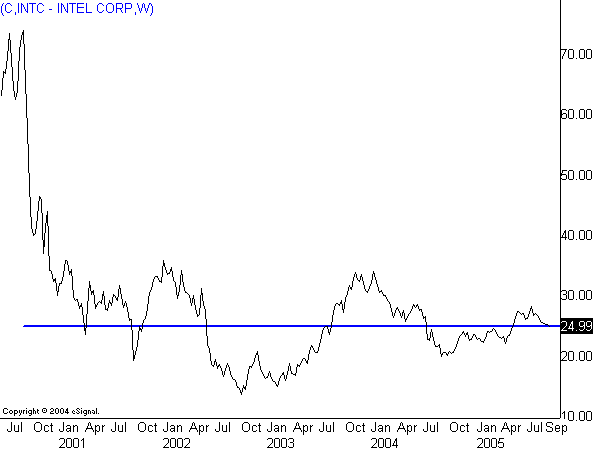Four Horsemen of Tech Look Lame
By Alan Farley
9/13/2005 12:00 PM EDT
Four blue-chip tech stocks ruled the roost in the 1990s. Analysts and advisers pounded the tables back then, telling every baby boomer to buy these leaders and hold them until retirement.
That was great advice for a few years, but things changed considerably after the bubble burst. These four horsemen of the tech revolution, Intel (INTC:Nasdaq) , Dell Computer (DELL:Nasdaq) , Cisco Systems (CSCO:Nasdaq) and Microsoft (MSFT:Nasdaq) have underperformed the market throughout the three-year bull advance.
On Monday, I discussed why the tech sector is critical to the longevity of this rally. Today I'll look at price action in these blue-chips and see if they're helping or hurting the bulls' cause. Considering their high exposure to key indices, these stocks can mean the difference between life and death for this uptrend.
Dell Computer
I surfed the Dell Web site last week to look at laptops for my upcoming trip to Europe. Although I've never bought anything from this well-respected company, my opinion of its operation had always been a good one
That visit turned out to be more enlightening than expected. Dell's focus on cheap and cheaper computers is undermining its historic strengths and turning it into another Gateway (GTW:NYSE) , a PC retailer that sacrificed quality for competitive prices.
Dell has run on hard times in recent days. Most recently, the Street gave Dell's earnings outlook a thumbs down, sending the stock to its lowest level since last May. A longer-term view of the chart is even more disturbing. The stock has gone nowhere since the middle of 2003.
Although the stock bottomed after its postbubble decline well before the broad market, it's never really followed through on a brief 2001 recovery that brought it within 3 points of current levels. This is dismal performance indeed.
But Dell is so widely loved that its poor performance hasn't stopped analysts from finding the silver lining in every piece of bad news. Just last weekend, Barron's featured a story telling readers the current decline was yet another buying opportunity. Believe this nonsense at your own risk.
Cisco Systems
Cisco Systems is another 1990s powerhouse that's gone nowhere during this bull market. Like Dell, it now trades near the same price levels it did in 2001. And despite a few bursts of investor interest, price has gone absolutely nowhere for the last 14 months.
Two weeks ago I got an email from a reader who wondered why Cisco can't get any respect on Wall Street. This reader was also a company employee, and listed the reasons the networking giant should be trading at higher levels. He mentioned balance sheet, profitability, cash on hand, market share and all the good things that good companies need to succeed.
But he failed to list two items that hurt this company's prospects down the road. First, there's a lot of networking equipment out there. Exploding demand in the 1990s led to a glut of many routers, switches and other network widgets. Much of this equipment is still sitting in the aftermarket at heavily discounted prices.
Second, the industry is in a technological boom that may not favor Cisco down the road. The explosion of wireless technologies is mind-boggling, and more entrepreneurial companies may be in a better position to capitalize on changing industry paradigms.
Did I mention that Cisco has more than six billion shares lying around in investor portfolios? That's an amazing piece of non-performing capital. Perhaps holders should reexamine the concept of "opportunity cost" and look for better places to park their money.
Microsoft
I still cringe whenever Microsoft announces a new initiative or product. Invariably, the proposal is designed to step on the toes of other companies that already have products or services supplying the same items in a cost-efficient manner.
It's amazing that this company still doesn't understand proper etiquette for a 400-pound gorilla, despite all the lawsuits and lost opportunities. Consider where Microsoft would be today if it settled its legal actions quickly and got on with the business of leading the tech revolution. The company could still be trading at new highs.
But that hasn't happened and it's unlikely Mr. Softee will see new highs in the next decade. The stock topped out almost six years ago and has underperformed most unprofitable companies since that time. That's quite a feat for one of the richest operations on the planet.
Of course, there's the cash hoard and an 8-cent quarterly dividend. Combine that with a sea of adoring analysts who work full-time pumping this out-of-touch giant. At least it makes a great gaming machine, or shareholders would really get upset about the chronic drag on their portfolios.
Intel
I have trouble saying bad things about Intel, but my reasons are completely selfish. The company just announced plans to build a huge fabrication plant within 4 miles of my home in south Tempe, Ariz.
That means an influx of white-collar employees will bid up the homes in our neck of the woods to megabubble prices. Thanks, Intel, you're the best.
But I can't say anything nice about the chart -- in fact, it's deja vu all over again. The stock traded at last week's levels in March and November 2001, June 2002, March 2003, July 2004 and March of this year.
Do you see the pattern here? That's right, Intel too has gone nowhere for the last four years.
That's a problem for one of the most widely held stocks in the world. As with the other three blue-chips, investors have wasted bucketloads of capital on this nonperforming giant.
Like Microsoft, Intel pays a small dividend that's supposed to make up for chronically poor performance during this decade. Thanks, but I think I'll pass and look for stocks that actually go up over time.
Angehängte Grafik:
27893.gif (verkleinert auf 85%)

